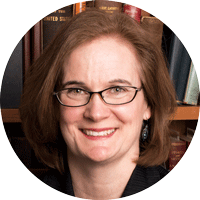

| Catholic University faculty and students are immersed in a culture of research. In this series we offer a sampling of the many big questions they are working on. |

Former federal prosecutor Mary Graw Leary sees the legal profession as a “vocation of service to the victimized.” She made the transition to academia in order to have greater opportunity to influence policy, national discourse, and scholarship when it comes to social issues such as human trafficking and the exploitation and abuse of women and children.
“Human trafficking is on the rise because we are normalizing people as commodities. When that happens, as a society, we are no longer horrified by the dehumanization of others, and we turn away from the reality that it is happening in our own communities.”“The law has made substantial steps forward, as this year we are celebrating the 20th anniversary of the Trafficking Victims Act. In 2018, bipartisan bills in the House and Senate amended Section 230 of the Communications Decency Act that provided protections to the owners of websites in regard to content posted by third parties. That 1996 law was passed before we knew how the Internet could become a haven for sex traffickers. More than 70% of sex trafficking comes from online advertisements. Traffickers have flourished on the largely unregulated Internet. The 2018 legislation allows prosecutors to go after the owners of websites who knowingly facilitate and profit from human trafficking. That being said, there remains much more to be done to help victims.”
“We need to change misconceptions about the causes and effects of prostituting and exploiting people. We all must face our role in demand and our responsibility to end modern day slavery. A great role model includes many faith-based groups — particularly women religious — that have historically been leaders in this area. They have been providing shelter to the marginalized long before the word ‘trafficking’ came into our vocabulary.”
Mary Graw Leary is a professor of law. She has served as a policy consultant and deputy director for the Office of Legal Counsel at the National Center for Missing and Exploited Children and as director of the National Center for the Prosecution of Child Abuse. She frequently serves as an expert in policy development related to victimization, exploitation, and technology. Her forthcoming book is titled Normalizing the Commodification of People.